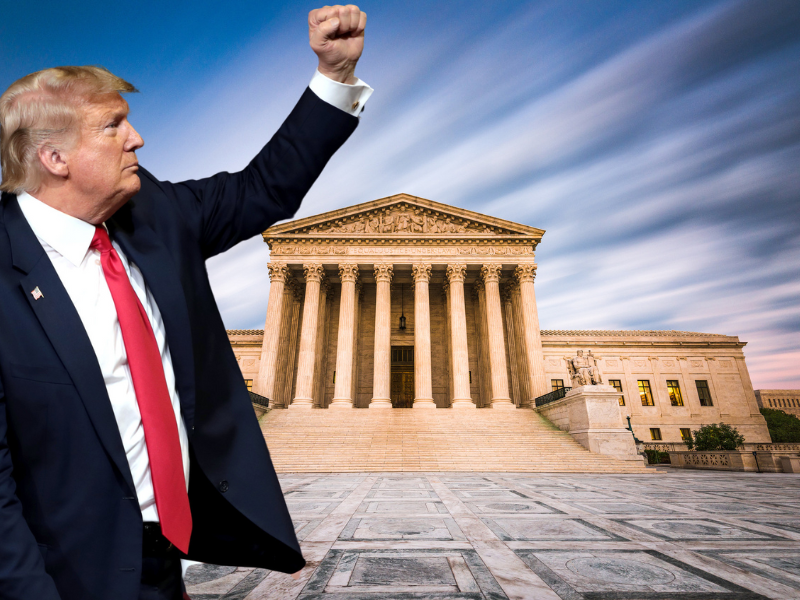By now, everyone who has any interest in the law or the Constitution or the presidential election of 2024 is aware of the case of Trump v Anderson and the March 4, 2024 opinion of the Supreme Court. Of course, most people will not have read the actual opinion or the two concurring opinions. Reading the numerous commentaries or listening to the numerous discussions by legal “scholars” and talking heads will give you some insight but also a lot of misdirection.
I want to give my readers a perspective that has been lost in all the news. The mob that hates former President Donald Trump has been trying every tactic they can find or invent to prevent him from winning the 2024 Presidential election. Bear with me as a give you a brief summary of the cases before returning to Trump v Anderson.
A special counsel was appointed by the Department of Justice with a broad (indeed, open ended) mandate to investigate Trump. He filed 44 charges in the District Court of the District of Columbia related to Trump’s alleged illegal retention of classified documents and obstructing the United States in its attempts to retrieve the classified documents. He separately filed four charges related to Trump’s alleged attempt to overturn the 2020 presidential election. They were for an alleged conspiracy to defraud the US, a conspiracy against the civil rights of the citizens of the US, and obstruction of justice
In Georgia, Fulton County District Attorney, Fanni Willis investigated alleged election fraud and indicted Trump and 18 others for an alleged conspiracy under the Georgia version of RICO and falsifying records. She filed 47 counts. Her case was initiated by an illegally taped phone call between Trump, a few aides, and Georgia Secretary of State Brad Raffensberger. Ms. Willis hired a man, Nathan Wade, as a prosecutor with whom she was having an affair. Mr. Wade was married—not to Ms. Willis. He was paid nearly $1 million in legal fees and he and Ms. Willis went on lavish vacation trips together.
In New York, Attorney General Leticia James filed charges under a New York state fraud statute that by its terms did not require a victim. The suit claimed that Trump overstated the value of his assets on financial statements submitted to banks to obtain loans. None of the banks that were allegedly defrauded claimed that they relied on Trump financial statements or that they suffered losses in their loan transactions. The judge found Trump guilty without hearing any evidence or defense by Trump and the Trump Organization. In the damages phase, the judge repeatedly told Trump that he wasn’t allowed to respond to the charges or to talk about the judge or his staff and he entered a gag order.
Manhattan District Attorney Alvin Bragg filed charges for campaign finance violations under New York law, based on alleged hush money payments by his then attorney, Michael Cohen, to porn star Stormy Daniels, even though the key alleged violation was under federal law. He bootstrapped that with an alleged violation under New York law, for which the statute of limitations had already expired.
Then there was a claim by E. Jean Carroll that Trump raped her more than 20 years ago. The statute of limitations was extended to allow her claims. When Trump publicly called a liar, she sued for defamation and was again awarded a huge verdict.
The ugly doesn’t end there.
An analysis of these cases and the current status of them is not my focus here. My point is that the various prosecutors are trying to stop Trump by imprisoning him or bankrupting him. It is looking increasingly unlikely that any criminal conviction will occur before election day.
So a group of well funded “public interest” lawyers came up with a strategy to prevent Trump from even being on the ballot. They fashion themselves as defenders of democracy. Orwell couldn’t write a better script. They dusted off Section 3 of the 14th Amendment to the US Constitution as their vehicle of attack. This was adopted after the Civil War to prevent Confederate soldiers and leaders from returning to positions of power. They located a few Republicans and Independents in Colorado to sue the Colorado Secretary of State to require her to remove Trump from the primary ballot. After the District Court rejected their claims, the appellate court reversed and held that Trump had engaged in an insurrection and it directed that the Colorado Secretary of State remove Trump from the ballot and not count any write in votes for Trump, but they stayed the ruling until an appeal to the US Supreme Court could be decided.
This is the text of Section 3 of the 14th Amendment to the US Constitution:
“No person shall be a Senator or Representative in Congress, or elector of President and Vice President, or hold any office, civil or military, under the United States, or under any State, who, having previously taken an oath, as a member of Congress, or as an officer of the United States, or as a member of any State legislature, or as an executive or judicial officer of any State, to support the Constitution of the United States, shall have engaged in an insurrection or rebellion against the same, or given aid or comfort to the enemies thereof. But Congress may, by a vote of two thirds of each House, remove the disqualification. (Emphases added.)
Note the language in Section 3 that for a person to be disqualified he must have “engaged in an insurrection or rebellion” against the Constitution of the United States (even assuming that Section applies to him as “an officer of the United States” seeking an “office … under the United States”, which by no means clearly applies to Trump seeking the presidency). There is a federal statute, 18 USC 2383, which expressly provides for criminal charges for persons engaging in an “insurrection or rebellion.” None of the numerous indictments against Trump charged him with violating 18 USC 2383. Note also that the only reference to an executive officer is to an “executive … officer of any State”. Trump was an executive officer of the United States, not of any State.
We can only conclude that all of the prosecutors did not think Trump violated 18 USC 2383 or that they did not think there was evidence to support a conviction. Notwithstanding that, the Colorado Supreme Court, without an evidentiary hearing, concluded that Trump had engaged in an insurrection. The complaint in Trump v Anderson did not allege a violation of 18 USC 2383.
The US Supreme Court reversed the Colorado Supreme Court 9-0. All nine Justices agreed that the states do not have the power to enforce Section 3 of the 14th Amendment because nothing in that section provides for state enforcement, but Section 5 of the 14th Amendment expressly gives Congress the power to enforce it by “appropriate legislation,” per the provisions of the 14th Amendment. The opinion goes on to spell out how Congress must act under Section 5. They also said that allowing states to enforce Section 3 would create chaos because it could result in different rulings based on different state rules and proceedings and thus undermine federalism, which is inherent in the Constitutional system of the United States. That the Supreme Court unanimously agreed to reverse the Colorado Supreme Court and unanimously agreed on these reasons is the good.
Now for the bad and then for the rest of the ugly. There were two concurring opinions. One was solely by Justice Barrett and the other was by Justices Sotomayor, Kagan and Jackson. Justice Barrett did not join this second concurring opinion. Why did Justices Sotomayor, Kagan and Jackson feel the need to dissent from part of the Court’s opinion? Here’s the key statements in this concurring opinion—the ugly:
“The majority announces that a disqualification can only occur when Congress enacts a particular kind of legislation pursuant to Section Five of the Fourteenth Amendment. In doing so, the majority shuts the door on other potential means of federal enforcement”. (Emphasis added)
“[U]nder the guise of providing a more “complete explanation for the judgment, the majority resolves many unsettled questions about Section 3. It forecloses judicial enforcement of that provision… (Emphasis added).
Justices Sotomayor, Kagan and Jackson are upset that federal courts or perhaps the president will not be able to declare a candidate an insurrectionist and prevent him from being a candidate for the presidency or other federal office, or assuming the presidency or other federal office, without having to get Congress to enact legislation to do so. It will also not be grounds for members of Congress to object to the certification of the vote of the Electoral College for president and vice president. This is why it was so important for them to refuse to join the Court’s opinion as to the enforcement power resting with Congress. Have no doubt that, in the event of a Trump victory in the 2024 Presidential election, there will be members of Congress who will object to the certification on the basis of Section 3 of the 14th Amendment and they will urge vice president Harris to disqualify Trump. All the moralizing about respecting a “fair and free election” will be memory holed.
We have witnessed unprecedented attacks on the legitimacy of the Supreme Court since the election in 2016 of Donald Trump. Many of those attacks have been directed at Justice Thomas for alleged conflicts of interests or on the basis of the political activism of his wife Ginni. At the time Justice Barrett was confirmed, many Senators insisted that she must recuse herself in all cases involving Donald Trump. If the Democrats win control of the House, they may impeach Justice Thomas. In any event, they may claim that his vote and/or the vote of Justice Barrett in Trump v Anderson is illegitimate and therefore the Court’s opinion that only Congress by specific legislation can enforce Section 3 is not binding.
Expect ugly to get uglier.
Trump photo: Gage Skidmore/Flickr





